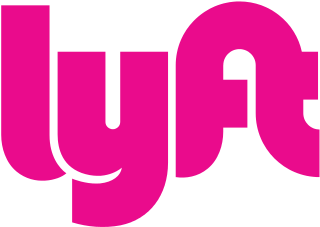
A high-occupancy vehicle lane is a restricted traffic lane reserved for the exclusive use of vehicles with a driver and at least one passenger, including carpools, vanpools, and transit buses. These restrictions may be only imposed during peak travel times or may apply at all times. There are different types of lanes: temporary or permanent lanes with concrete barriers, two-directional or reversible lanes, and exclusive, concurrent, or contraflow lanes working in peak periods.

Carpooling is the sharing of car journeys so that more than one person travels in a car, and prevents the need for others to have to drive to a location themselves. Carpooling is considered a Demand-Responsive Transport (DRT) service.

The Metropolitan Transportation Authority (MTA) is a public benefit corporation in New York State responsible for public transportation in the New York City metropolitan area. The MTA is the largest public transit authority in North America, serving 12 counties in Downstate New York, along with two counties in southwestern Connecticut under contract to the Connecticut Department of Transportation, carrying over 11 million passengers on an average weekday systemwide, and over 850,000 vehicles on its seven toll bridges and two tunnels per weekday.

Slugging, also known as casual carpooling and flexible carpooling, is the practice of forming ad hoc, informal carpools for purposes of commuting, essentially a variation of hitchhiking. A driver picks up these non-paying passengers at key locations, as having these additional passengers means that the driver can qualify to use an HOV lane or not be subject to road pricing. Slugging is common mostly in the U.S., specifically in major cities such as the Washington metropolitan area, San Francisco, Houston.

Lyft, Inc. is an American company offering ride-hailing services, motorized scooters, bicycle-sharing systems, and rental cars in the United States and select cities in Canada. Lyft sets fares, which vary using a dynamic pricing model based on local supply and demand at the time of the booking and are quoted to the customer in advance, and receives a commission from each booking. Lyft is the second-largest ridesharing company in the United States after Uber.

Shared transport or shared mobility is a transportation system where travelers share a vehicle either simultaneously as a group or over time as personal rental, and in the process share the cost of the journey. It is a transportation strategy that allows users to access transportation services on an as-needed basis, and can be regarded as a hybrid between private vehicle use and mass or public transport. Shared mobility is an umbrella term that encompasses a variety of transportation modes including carsharing, Bicycle-sharing systems, ridesharing companies, carpools, and microtransit.
Waze Mobile Ltd, doing business as Waze, formerly FreeMap Israel, is a subsidiary company of Google that provides satellite navigation software on smartphones and other computers that support the Global Positioning System (GPS). In addition to turn-by-turn navigation, it incorporates user-submitted travel times and route details while downloading location-dependent information over a cellular network. Waze describes its application as a community-driven initiative that is free to download and use.

Zimride by Enterprise Holdings was an American carpool program that matched inter-city drivers and passengers through social networking services. It was offered to universities and businesses as a matchmaking service. The company was founded in May 2007. After the launch of the Lyft app in May 2012 for intra-city rides, the Lyft app rapidly grew and became the focus of the company. Zimride officially renamed as Lyft in May 2013, and the Zimride service was sold to Enterprise Holdings in July 2013. As of July 2013, the service had over 350,000 users and had partnerships with Facebook and Zipcar.
carpooling.com was a carpooling service that connected drivers and passengers so they can share a ride. It was Europe's largest carpooling network. In 2015, it was acquired and folded into BlaBlaCar.

Wingz, Inc. is a vehicle for hire company that provides private, scheduled, and fixed-price rides in 30 major cities across the United States via mobile app. The service provides rides anywhere in the cities it serves, with a focus on airports. Wingz offers the ability to request specific drivers for rides and allows users to build a list of their favorite drivers for future bookings.

Logan D. Green is the chairman and former CEO of Lyft, which he co-founded with John Zimmer in 2012. Lyft grew out of Zimride, a rideshare company previously founded by the duo in 2007.
Sidecar was a US-based vehicle for hire company that provided transportation and delivery services. It was founded in 2011 in San Francisco and closed on December 31, 2015.

A ridesharing company is a company that, via websites and mobile apps, matches passengers with drivers of vehicles for hire that, unlike taxis, cannot legally be hailed from the street. The vehicles used in ridesharing/ridehailing service are called app-taxis or e-taxis.

Chariot was a commuter shuttle service owned by the Ford Motor Company. The company's mobile-phone application allowed passengers to ride a shuttle between home and work during commuting hours. Chariot operated in cities in the United States and Europe. New routes were determined based on demographic information and crowdsourced data. The company ceased shuttle operations in February 2019.
The legality of ridesharing companies by jurisdiction varies; in some areas they are considered to be illegal taxi operations, while in other areas, they are subject to regulations that can include requirements for driver background checks, fares, caps on the number of drivers in an area, insurance, licensing, and minimum wage.

MTA Bus Time, stylized as BusTime, is a Service Interface for Real Time Information, automatic vehicle location (AVL), and passenger information system provided by the Metropolitan Transportation Authority (MTA) of New York City for customers of its bus operations under the New York City Bus and MTA Bus Company brands. First tested in late 2010 and officially launched in early 2011, MTA Bus Time was installed in all MTA bus routes in New York City by 2014.

Via Transportation, Inc. is a technology company that provides software as a service (SaaS) and operations to improve public transportation networks for cities, transit agencies, schools and universities, healthcare providers, and corporations around the world. Via offers fully managed transit services as well as transportation planning tools, consulting services, operational support, and navigation.

Fasten Inc. was an American vehicle for hire company based in Boston, Massachusetts. Founded in 2015, it ceased U.S. operations in 2018 and was acquired by the Vezet Group.
Ride sharing networks face issues of user privacy like other online platforms do. Concerns surrounding the apps include the security of financial details, and privacy of personal details and location. Privacy concerns can also rise during the ride as some drivers choose to use passenger facing cameras for their own security. As the use of ride sharing services become more widespread so do the privacy issues associated with them.

Homobiles is an American nonprofit organization founded in 2011 which provides rides primarily to the San Francisco LGBT community on a pay-what-you-can model. Lynn Breedlove founded the organization as an alternative to taxi services and public transportation in order to counter discrimination against drag queens, transgender riders, and other members of the LGBT community. Rides are arranged through phone call, text message, or mobile application similar to other transportation network (ridesharing) companies.















